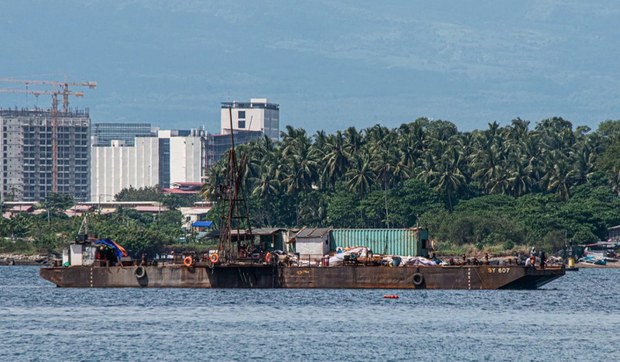Philippines defense chief: ‘Covert’ actions of Chinese workers in country a ‘security risk’
2023.09.15
Manila
 A boat carries Filipino and Chinese workers involved in the construction of a bridge linking Davao city and Samal island in the Philippines, Nov. 6, 2022.
A boat carries Filipino and Chinese workers involved in the construction of a bridge linking Davao city and Samal island in the Philippines, Nov. 6, 2022.
The Philippine defense chief has said that possible “covert” activities by Chinese workers in the country are a “security risk” and the defense department’s current focus was on such actions.
Workers from China who are in and out of the Philippines on a regular basis are difficult to keep track of, Defense Secretary Gilberto Teodoro Jr. told lawmakers during his confirmation hearing on Wednesday.
Opposition Senator Risa Hontiveros had asked Teodoro about the national security implications of Chinese state-owned enterprises’ (SOEs) operations in critical public services, including energy and telecommunications.
“The SOEs and infrastructures, that’s not so much a problem because we can monitor it and we have default control over it. It’s the activities that we cannot see that’s worrisome,” Teodoro said in reply.
“So what I want to know and what we are currently focusing on are the covert economic activities and information activities that are not openly happening.”
Chinese workers, especially those that frequently come and go, are a “security risk” because the government cannot monitor them, Teodoro added.
The State Grid Corporation of China owns 40% of the National Grid Corporation of the Philippines, while state-owned China Telecom partly owns one of the archipelago’s telecommunications providers, DITO Telecom.
During the administration of former President Rodrigo Duterte, there was an influx of Chinese workers in the country, particularly in the Philippine offshore gaming operations, or POGOs.
These operations cater mainly to customers in mainland China, where gambling is banned. At their peak, POGOs hired more than 300,000 Chinese workers, according to officials
Earlier this week, the Philippine Coast Guard spokesman had alleged without offering proof that China was running a disinformation campaign supported by ‘state actors” on Manila’s dispute with Beijing on the West Philippine Sea, which is the part of the South China Sea within Manila’s exclusive economic zone.
The Philippines in 2016 won a landmark ruling in the Permanent Court of Arbitration in The Hague, which threw out China’s expansive claims in the South China Sea. Beijing, however, has ignored the ruling and carried on with its military expansionism in the strategic waterway, including building artificial islands.
“I hope we are keeping tabs on those hostile state actors and doing what we can to minimize their ability to influence public opinion in the Philippines,” Sen. Hontiveros said.
Teodoro said the defense department and the Philippine military knew about the “fusion of external threats through internal activities” but they were still verifying reports.
“The best way … to weaken a country, rather than an overt war-like disruption of your facilities, is really to take control of [the] internal economy, internal processes and the like,” Teodoro said.
He added that there was a need for intelligence and confidential funds allotment for different agencies “to prevent” such eventualities.
Meanwhile, China has increased its presence in the South China Sea. Beijing has consistently deployed its China Coast Guard ships and maritime militia vessels to harass Philippine ships, Filipino officials said.
Philippine ally the United States is seeking access to more bases in the Philippines on top of nine sites already included under an expanded pact amid heightened regional tensions with China, Philippine military chief Romeo Brawner Jr. and Adm. John C. Aquilino, head of the U.S. Indo-Pacific Command said this week.
Froilan Gallardo and Richel V. Umel in Cagayan de Oro city, southern Philippines, contributed to this report.







